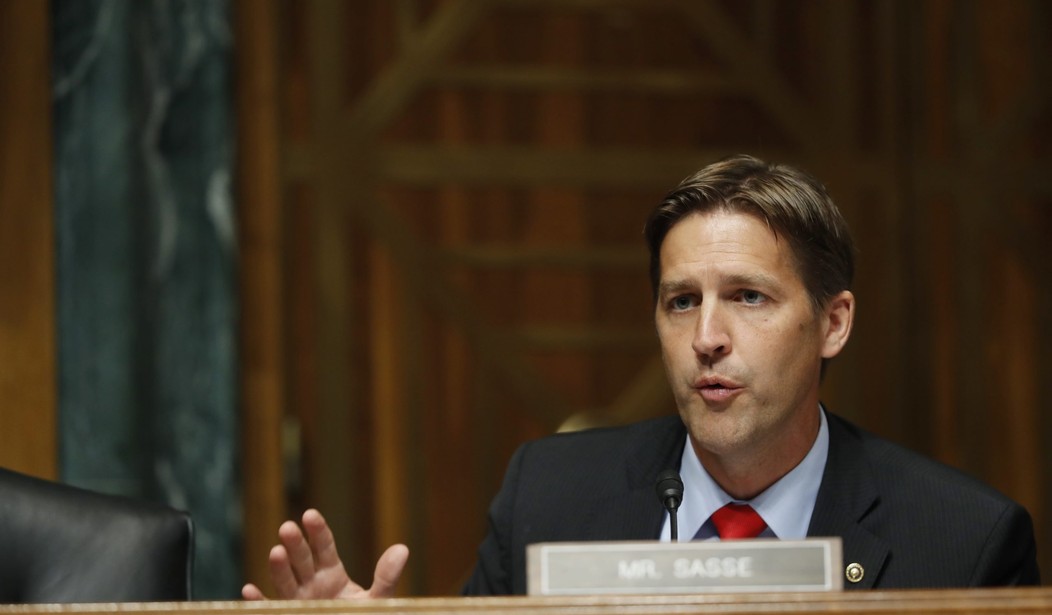WASHINGTON – Sen. Ben Sasse (R-Neb.) rejected President Trump’s rhetoric on trade policy, arguing that “industrial jobs from the 1950s” that have disappeared are not coming back.
“The failure of Washington to have a big discussion with the American people about what is actually happening in the economy has huge negative implications for our economics, for our civil society and for our national security because ultimately the people need to be told the truth. The people deserve to be told an honest answer about where we are in economic history,” Sasse said at a recent Heritage Foundation event, “National Security Implications of Withdrawing from NAFTA.”
“The people need not to be lied to, saying we are going to make it 1950 again – because it’s not true and it’s not going to help the specific workers and the specific disrupted industries, and it sure as heck isn’t going to help their kids to be told that the primary problem they face is that they are victims of other people who are cheating them. That’s not true,” he added. “What’s actually needed for the United States and for our workers and our educational system, which needs to be radically upgraded, is to prepare for the more nimble economy of the future, which is inevitable.”
Sasse said the “disruption” that’s taking place in agriculture and other industries should be attributed primarily to technology and not trade policy.
“It is indisputable that what is happening right now in the disruption of work is a consequence primarily of technology, not primarily of trade. Trade is a big deal. I don’t think there’s anybody in the U.S. Senate that is more pro-trade than I am,” he said. “I think trade has immense human benefits, and yet trade is not really what is driving most of the anxiety people feel right now and we need to be clear about what is happening economically.”
Sasse cited statistics on the history of agriculture in the U.S. to support his argument.
“No one is ever going to make America 1950 again in terms of large-scale industrial jobs, and no one is ever going to make America 1850 again in terms of agricultural jobs, and none of us would think that we would want that,” he said. “So in 1900, 41 percent of American workers worked on the farm. Today, it’s well under 2 percent; total agricultural output is off the charts higher in terms of quantity and quality than 118 years ago.”
Sasse said too many politicians are not being honest with the American people about the sources of their economic anxiety.
“The rhetoric in this town where politicians always lie and pretend they can fix whatever big bit of anxiety you have, ‘we’re going to bring back industrial factory jobs from the 1950s’ – no we’re not, that is simply not true. It’s not what’s going to happen and there’s no economic theory to defend that rubbish,” he said.
“The highwater mark of industrial employment in U.S. history was in the mid-1950s, where 31 percent of American workers worked in factories. Today, 7 percent of American workers work in a factory and there’s more total output in terms of both quantity and quality,” he added.
Sasse explained why he opposes Trump’s tariffs on steel and warned of the dangers of protectionism.
“Consumers lose whenever there are more tariffs, which just means tax on consumers. Whenever there are more tariffs, consumers on both side of the border lose because you are telling voluntarily parties who wanted to make something and sell it and another voluntarily party that wanted to make something and buy it that they can’t go through with that transaction. A government is going to stand between you and say we want less of these transactions and so we are going to put taxes in here to dis-incentivize this transaction,” he said.
“The steel tariffs we are talking about in Washington, D.C., will kill jobs in America in steel, so consumers always lose with protectionism, retaliated-against industries always lose with protectionism, but even the politicians’ rhetorical lie that they are going to save steel jobs, it’s not true. You are going to cost steel jobs with these tariffs. The only question is how many,” he added.
Sasse predicted that the U.S. would eventually see “retaliatory tariffs” in response to the tariffs on steel imports.
“Retaliatory tariffs are inevitable,” he declared.
Sasse said the use of existing “dispute mechanisms” is the best way for the U.S. to respond to unfair trade tactics from China and other countries.
“When we go to the WTO, we win more than 90 percent of the time,” he said.









Join the conversation as a VIP Member